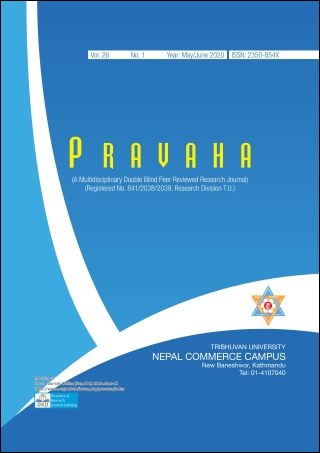Post-Earthquake Reconstruction in Nepal: Conformance the Assumptions, Actions, and Achievements
DOI:
https://doi.org/10.3126/pravaha.v26i1.41869Keywords:
congruence measurement, performance evaluation, reconstruction policy, econ-cultural resiliency, grievance handlingAbstract
Post-earthquake reconstruction works is a consequential mission. The principal premises of the mission are the goal of speedily rebuilding, well-structured plans, extensive local resources mobilization, and commissioning leadership in the reconstruction and rehabilitation works. Nepal’s pluralistic character, political upheavals, and shortcoming of resources are real-time challenges to mission accomplishment. Congruence of the assumptions, actions, and achievements concerning physical, socio-psychological, cultural, and financial dimensions of vulnerabilities is of foremost significance because the social acceptance and/or rejection is a critical determinant of the mission accomplishment. This study aims to determine the congruence level of assumptions, actions, and accomplishments concerning the managerial process activities of the National Reconstruction Authority, which are addressing the concerns of reconstruction work, national interest, and social justice. An exploration on the Authority’s attention to the reciprocal eco-cultural resiliency measures has also been made to find a balance among the concerns. The study begins with reviewing the Acts, policies, directives, standards, and working procedures concerning the reconstruction works. The Authority’s annual reports and decisions of the Appellate Committee are taken as the sources of information. A matrix form of NRA’s process activities, key assumptions, major actions, and notable accomplishments is prepared for analysis. Matchmaking of the assumptions with the actions and achievements has been made, and the level of their congruence assessed. The level of congruence among the assumptions, actions, and achievements concerning the consequential mission is found unsatisfactory. There is an absence of process activities concerning the reciprocal eco-cultural resiliency, national interest, and social justice. Partially adapted the process activities and corresponding assumptions, actions, and achievements seems insufficient to achieve the envisioned transformation in the disaster-affected districts. Deeply rooted self interest of the people and institutions associated with the consequential mission stands as a major challenge in the process of reconstruction.
Downloads
Downloads
Published
How to Cite
Issue
Section
License
© Nepal Commerce Campus, TU
Authors are required to transfer their copyright to the Nepal Commerce Campus, TU.




